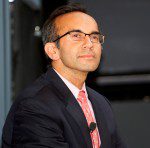 The following letter was published in SAI’s Year in Review 2015-2016.
The following letter was published in SAI’s Year in Review 2015-2016.
Dear Friends,
This has been a year of firsts for the Harvard South Asia Institute. Since its establishment as an Institute by the University in 2013, SAI’s programs have continued to grow in scale and impact, across Harvard and South Asia, in addition to receiving attention from educational institutions across the United States and Europe.
In 2015, SAI’s Arts Initiative was launched to align with Harvard President Drew Faust’s commitment to strengthen the foundational role of the humanities on campus. The Initiative is supported by a newly formed Arts Advisory Council whose members (from Bangladesh, India, Pakistan, and the United Kingdom) are committed to spreading global awareness of South Asian art. During the recent Fall and Spring semesters, emerging artists from India, Nepal, and Pakistan visited SAI for two weeks each to showcase their work, engage with faculty and students, attend classes relevant to their areas of interest, and visit Harvard and Boston area museums and libraries. This small but promising beginning has already opened up many avenues for scholarship.
Also in its first year, the multi-phased project, ‘Livelihood Creation in India through Social Entrepreneurship and Skill Development,’ funded by the Tata Trusts, brought together seven faculty from five schools across Harvard. The focus of the project is to leverage research at Harvard to further livelihood creation in a developing country. In the experimental phase, the Harvard team ran three year-long pilot projects centered on the handicrafts and handloom sectors, empowerment of women, and science and technology-based interventions for poverty alleviation. Given the initial impact of the program, including identifying exciting new sites for faculty research and Harvard student engagement, we now have a roadmap for expansion of this effort over several years. Hopefully, we will also kindle enthusiasm for this work in other countries in the region.
Another in this year of firsts was the establishment of the ‘Seed for Change’ program. With the generous support of two new members of the SAI Advisory Council, SAI will run a university-wide competition annually and award $50,000 to student ideas that best use creative solutions to address intractable problems in India. The program gives students the opportunity to apply classroom insight to community action, as a precursor to further scholarship and refinement. Over time, this program will build a cohort of alumni who inspire and mentor other students to think of South Asia as a source of ideas, and as a setting within which their creativity can be expressed. Thanks to generous support from an alumnus in Karachi, the program will also expand to include Pakistan in the coming year.
The idea of the ‘Seed for Change’ program fits in with the tenor of other university-wide competitions such as the President’s Challenge, Deans Cultural Challenge in Entrepreneurship, Radcliffe Institute’s Public Art Competition, and so on.
We have also advanced our nascent activities in the sciences. We are prototyping an exciting program to connect the vast pool of young scientists in South Asia and Boston, initially in the life sciences, and eventually in a range of other scientific fields. This will build on our efforts over the past five years across a range of healthcare-related fields and on the intersection of engineering and medicine.
SAI continues to strengthen partnerships with the other regional studies centers at Harvard. In conjunction with the Fairbank Center for Chinese Studies, we launched a university-wide series of research workshops on ‘Meritocracy’ in China and India. The workshops drew on humanists, social scientists, lawyers, and engineers, among others, to discuss the manner in which the two countries nurtured and allocated talent, and the extent to which these systems were residues from decades, even centuries, past. It’s hard to think of something more central to a University like Harvard than the idea of meritocracy.
As with the Meritocracy project, SAI’s raison d’être continues to center on being a catalyst and connector. A long-standing project on the Partition of British India is now, for example, evolving into a major scholarly initiative. The Partition Project will connect scholars from, and of, Bangladesh, India, and Pakistan. Like our Kumbh Mela project from some years back, it will bring together doctors, human rights academics, social scientists, and urban planners, among others, in a major scholarly effort that promises to shed much light on the forced migration underway in many distressed parts of the world, and on the challenges associated with urbanism amidst tumult.
To support these and the many other programs currently underway, SAI has strengthened its administrative infrastructure. We now have faculty representation on our Steering Committee from schools across Harvard, and additional office space granted to SAI in the Center for Government and International Studies. We will add another senior Communications staff member to the Cambridge office to support the current team in sharing SAI’s impact within and beyond Harvard.
We are currently working with the University Committee on International Programs and Sites to establish a new office in Delhi to serve the University as a hub for scholarship. SAI will continue to increase its presence in Pakistan thanks to ongoing and important support from alumni and sponsors. A new representative based in Lahore will complement the current SAI presence in Karachi.
In the year ahead, SAI will continue to expand these and other offerings while adding new initiatives to strengthen Harvard’s regional relevance and leadership across South Asia, with plans underway in Afghanistan, Bangladesh, Myanmar, Nepal, and Sri Lanka.
The Year in Review 2015-16 presents the full catalogue of 2015-16 activities and suggest the critical role faculty, students, and regional partners play in guiding the institute to promote and catalyze research and teaching in and about South Asia.
I invite you to connect with us, revel in our dialogue and debate, and help actively shape our intellectual agenda.
Regards,
Tarun Khanna
Director, Harvard South Asia Institute
Jorge Paulo Lemann Professor, Harvard Business School
